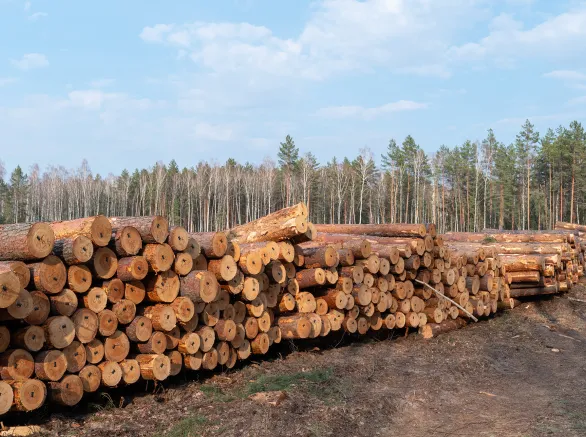James et al. 2024 Chapter 2. Physics and Chemistry and Chapter 10. Environmental Forensics in The Environmental Science Deskbook 2024-2025 Edition. Ed. J.W. Conrad and W.L. Goodfellow. Clark Boardman Callaghan & Thomson Reuters Law Products. ISBN: 9798350287578
Guerrini, I., Pinheiro da Silva, J., Sivisaca, D., Góes de Moraes, F., Puglla, C., Neto, C., Silva, R., Justino, S., Roder, L., James, J. Capra, G., Ganga, A. 2024. Evaluating carbon stocks in soils of fragmented Brazilian Atlantic Forests (BAF) based on soil features and different methodologies. Scientific Reports 14, 10007. https://doi.org/10.1038/s41598-024-60629-y.
Mayer, M., A. Baltensweiler, J. James, A. Rigling, F. Hagedorn. 2024. A global synthesis and conceptualization of the magnitude and duration of soil carbon losses in response to forest disturbances. Global Ecology and Biogeography, 00, 1-10. https://doi.org/10.1111/geb.13779.
EPRI. 2023. Coal Combustion Product Disposal Units with Intersecting Groundwater: Geochemical Modeling of Closure-in-Place and Remedial Actions. EPRI, Palo Alto, CA. 3002027225.
James, J., R.B. Harrison. 2023. Dissolved organic carbon. In: Goss, M. and Oliver, M. (Eds.) Encyclopedia of Soils in the Environment Second Edition. Vol. 2, pp. 421-431.
Roder, L.R., I.A. Guerrini, D.C. Sivisaca, C.A. Puglla, F. Goes de Moraes, J. Pinheiro da Silva, R.C.B. Fonseca, M.T. Umbelino, J.N. James, G.F. Capra, A. Ganga. 2023 Atlantic rainforest natural regeneration in fragmented formations affected by increasing human disturbance. Journal of Environmental Management. 325:116521.
EPRI. 2022. Chemical Constituents in Coal Combustion Products: The Chemical Profile Interactive Tool, V2.0. EPRI, Palo Alto, CA. 3002023681.
Wechsung, A., C.B. Buehler, J. James, A.M. Morrison., M. Stern 2022. Carbonomics: introduction to carbon pricing, regulations, and frameworks. CEP. Special Section: Accelerating Decarbonization pp. 23-29.
James, J., D. Page-Dumroese, M. Busse, B. Palik, J. Zhang, B. Eaton, R. Slesak, J. Tirocke, H. Kwon. 2021. Effects of forest harvesting and biomass removal on soil carbon and nitrogen: two complementary meta-analyses. Forest Ecology and Management 485:118935.
Mayer, M., C.E. Prescott, W. Abaker, L. Augusto, L. Cecillon, G. Ferreira, J. James, R. Jandl, K. Katzensteiner, J.P. Laclau, J. Laganiere, Y. Nouvellon, D. Pare, J.A. Stanturf, E.I. Vanguelova, L. Vesterdal. 2020. Tamm Review: Influence of forest management activities on soil organic carbon stocks: A knowledge synthesis. Forest Ecology and Management 466:118127.
Koch, J., Bogard, M., Butman, D., Finlay, K., Ebel, B., James, J. Johnston, S., Jorgenson, M., Pastick, N., Spencer, R., Striegl, R., Walvoord, M., Wickland, K. 2022. Heterogeneous patterns of aged organic carbon export driven by hydrologic flow paths, soil texture, fire, and thaw in discontinuous permafrost headwaters. Global Biogeochemical Cycles 36:4. https://doi.org/10.1029/2021GB007242.
Guerrini, I., Sampaio, T., Bogiani, J., Backes, C., Harrison, R., Oliveira, F., Gava, J., Traballi, R., Mota, R., Roder, L., Grilli, E., Ganga, A., James, J., Capra, G. 2021. Sewage sludge as a pedotechnomaterial for the recovery of soil compacted by heavy machinery on Eucalyptus commercial plantation. Journal of Cleaner Production 325:20. https://doi.org/10.1016/j.jclepro.2021.129320.
EPRI. 2020. Chemical constituents in coal combustion products: boron. EPRI Final Report 3002018777. Electric Power Research Institute. Palo Alto, CA.
Faria, M.F., I.A. Guerrini, F.C. Oliveira, M.I.Z. Sato, J.R.S. Passos, J.N. James, R.B. Harrison. 2020. Survival of thermotolerant coliforms in municipal biosolids after application in tropical soil cultivated with Eucalyptus. Journal of Environmental Management 274:111116.
Guerrini, I.A., T.F. Sampaio, J.C. Bogiani, C. Backes, R.B. Harrison, F.C. Oliveira, J.L. Gava, R.C. Traballi, R.G.M. Mota, L.B. Roder, E. Grilli, A. Ganga, J.N. James, G.F. Capra. 2021 Sewage sludge as a pedotechnomaterial for the recovery of soils compacted by heavy machinery on Eucalyptus commercial plantation. Journal of Cleaner Production 325:129320.
James, J.N., C.D. Gross, P. Dwivedi, T. Myers, F. Santos, R. Bernardi, M.F. Faria, I.A. Guerrini, R.B. Harrison, and D.E. Butman. 2019. Land use change alters the radiocarbon age and composition of soil and water-soluble organic matter in the Brazilian Cerrado. Geoderma 345:38-50.
Rocha J.H., R.B. Harrison, M. Menegale, J.L. Gonçalves, M. Rodrigues, P. Pavinato, E. Foltran, and J.N. James. 2019. Impacts of timber harvesting intensity and P fertilizer application on soil P fractions. Forest Ecology and Management 437:295-303.
F.C. Oliveira, M.F. Faria, E.I. Bertoncini, M.I. Sato, E.M. Hachich, I.A. Guerrini, J.R. Passos, J.N. James, R.B. Harrison, T.G. Feitoza, J.J. Chiaradia, C.H. Abreu-Junior, and L.P. Moraes. 2019. Persistence of fecal contamination indicators and pathogens in Class B biosolids applied to sugarcane fields. Journal of Environmental Quality 48(2):526-530.
James J.N., N. Kates, C.D. Kuhn, C.E. Littlefield, C.W. Miller, J.D. Bakker, D.E. Butman, and R.D. Haugo. The effects of forest restoration on ecosystem carbon in western North America: a systematic review. 2018 Forest Ecology and Management 2018; 429:625-641.
Gross C.D., J.N. James, E. Turnblom, and R.B. Harrison. 2018 Thinning treatments reduce deep soil carbon and nitrogen stocks in a coastal Pacific Northwest forest. Forests 9(238).
Dietzen C., E. Marques, J.N. James, R. Bernardi, S. Holub, and R.B. Harrison. 2017. Response of deep soil carbon pools to forest management in a highly productive Andisol. Soil Science Society of America Journal 81:970-978.
James J.N., R.B. Harrison. 2016. The effect of harvest on forest soil carbon: A meta-analysis. Forests 7(308).
Menegale M., J. Rocha, R.B. Harrison, J.L. Gonçalves, R. Almeida, M. Picollo, A. Hubner, J.N. James, and S. Michelson-Correa. 2016. Effect of timber harvest intensities and fertilizer application on stocks of soil C, N, P, and S. Forests 7(319).
Faria M.F., I.A. Guerrini, F.C. Oliveira, M. Sato, E. Hachich, J. Passos, L. Goulart, T. Silva, J. Gava, J. Furches, J.N. James, and R.B. Harrison. 2016. Persistence of Ascaris spp. ova in tropical soil cultivated with Eucalyptus and fertilized with municipal biosolids. J. Environ. Qual. 46(3):522-527.
James J.N., K. Littke, T. Bonassi, and R.B. Harrison. 2016. Exchangeable cations in deep forest soils: separating climate and chemical controls on spatial and vertical distribution and cycling. Geoderma 279:109-121.
James J.N., C. Dietzen, J. Furches, and R.B. Harrison. 2015. Lessons in buried horizons and pedogenesis from deep forest soils. Soil Hor. 56(6).
James J.N., E. Knight, V. Gamba, and R.B. Harrison. 2015. Deep soil: Quantification, modeling, and significance of subsurface nitrogen. For. Ecol. and Manag. 336:194-202.
James J.N., W. Devine, T. Terry, and R.B. Harrison. 2014. Deep soil: Accurately quantifying and modeling carbon in subsurface layers. Soil Sci. Soc. Amer. J. 78:S1-S10.


